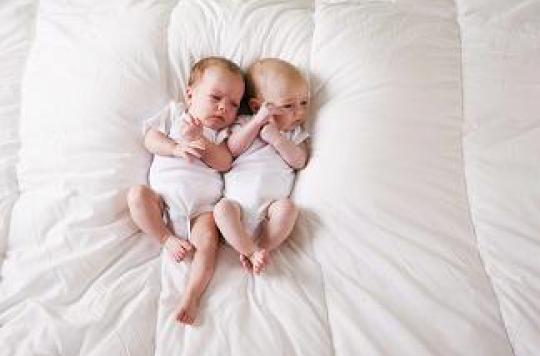Getting pregnant with several children can cost five to twenty times more than a single pregnancy.

Learning that you are expecting several children can be a source of happiness … but not necessarily for the wallet. According to a study published on November 11 in theAmerican Journal of Obstetrics & Gynecology, multiple pregnancies are much more expensive than single pregnancies.
€ 300,000 for triplets
To identify positions in which twin or single pregnancies differ in cost, the researchers analyzed the numbers in the database Truven Health MarketScan Commercial Claims and Encounter. This independent source compares different health data. She tells us that in 2010 out of 437,000 births in the United States 12,000 were to twins and 560 to triplets.
Medical expenses from 27 weeks gestation to one month after childbirth were included in the calculation, as well as those during the first year of the infant (s). “By taking a broad approach, we have shown that the medical expenses charged to mothers and newborns vary with the number of children delivered,” said Dr. Dongmu Zhang, lead author of the study. Thus, during a single pregnancy, € 15,600 is spent on average. With twins, the sum rises to around € 80,000 and almost € 300,000 for triplets. The cost of a pregnancy increases five to twenty times depending on the number of children delivered.
No more health problems
The additional expenses are mainly related to illnesses of the mother. Women who are pregnant with twins, triplets or more experience more health problems before and / or during pregnancy. We thus observe higher rates of hypertension, diabetes, anemia but also cardiovascular diseases, kidneys and genital or urinary infections in this population. As a result, the rate of caesarean section and length of hospital stay are increased, which means higher healthcare costs.
In the United States, the twin pregnancy rate has increased 76% since 1980 according to the Centers for Disease Control (CDC). In 40% of cases, this type of pregnancy is the result of assisted procreation. In France, in 2011, 13,668 births were double, 205 triples and 3 quadruple, according to the National Institute of Demographic Studies (Ined). The authors of the study denounce higher and “unfair” costs for families who have not had IVF and are not expecting twins or triplets. The French system is more equitable, since health expenses related to pregnancy are covered by social security.
.















